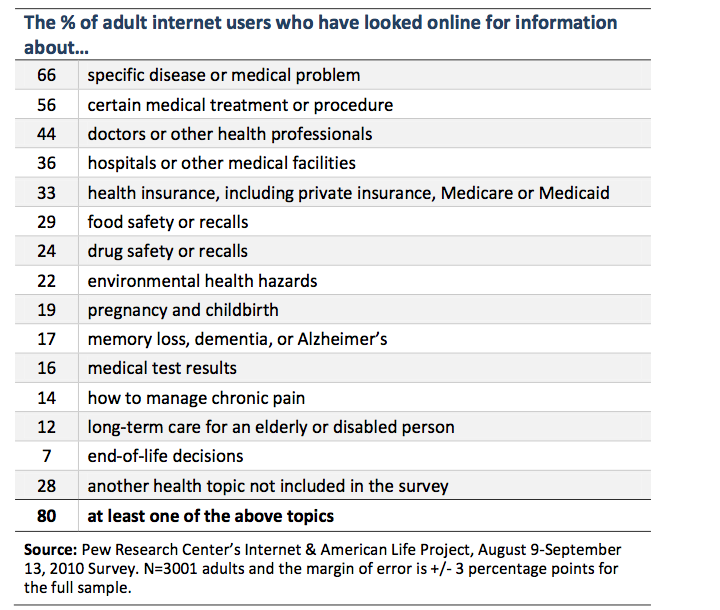How people are using social media to find health information
The findings from a telephone survey of 3001 adults show that social media and the internet are increasingly important for finding health information.
This has important implications for the marketing professionals in the biotechnology and pharmaceutical industries who struggle to come to grips with social media in the absence of any FDA guidance.
The Pew Internet & American Life Project published today their survey on “The Social Life of Health Information, 2011.” It makes for interesting reading. Some of the statistics I found of interest, relating to the United States, include:
- 74% of adults use the internet
- 59% of adults (80% of internet users) have looked for online health information around a disease or major health topic

- 25% of adults (34% of internet users) have read someone else’s commentary or experience about a health issue on an online news group, website or blog
- 19% of adults (25% of internet users) have watched an online video about health or medical topics (See my previous post on using social media such as video to recruit for clinical trials)
- 13% of adults (18% of internet users) have consulted online reviews of particular drugs or medical treatments
As this insightful report notes, “people use online social tools to gather information, share stories, and discuss concerns.”
Pharmaceutical and biotechnology companies will have to come to terms with addressing the increasing desire of patients for information, presented in a way that is fair balanced and non-promotional.
The power of social media to potentially change the paradigm of how medical data is gathered was also highlighted in the recent paper published in Nature Biotechnology.
This paper presented an analysis of data collected on the website PatientsLikeMe for those suffering from amyotrophic lateral sclerosis (ALS). While such data will never replace a randomized, blinded drug study, I think that patient community data could have a role to play in areas around Quality of Life (QoL) assessments and post-marketing surveillance.
Increased fast internet access is driving social media and the demand for quality health information. This trend is only set to continue.
![]() Wicks, P., Vaughan, T., Massagli, M., & Heywood, J. (2011). Accelerated clinical discovery using self-reported patient data collected online and a patient-matching algorithm Nature Biotechnology, 29 (5), 411-414 DOI: 10.1038/nbt.1837
Wicks, P., Vaughan, T., Massagli, M., & Heywood, J. (2011). Accelerated clinical discovery using self-reported patient data collected online and a patient-matching algorithm Nature Biotechnology, 29 (5), 411-414 DOI: 10.1038/nbt.1837